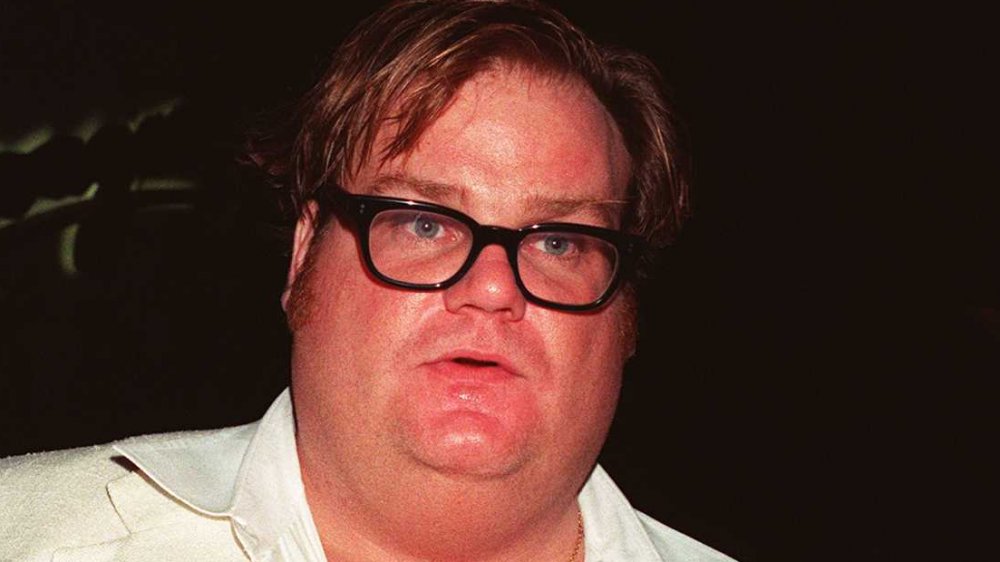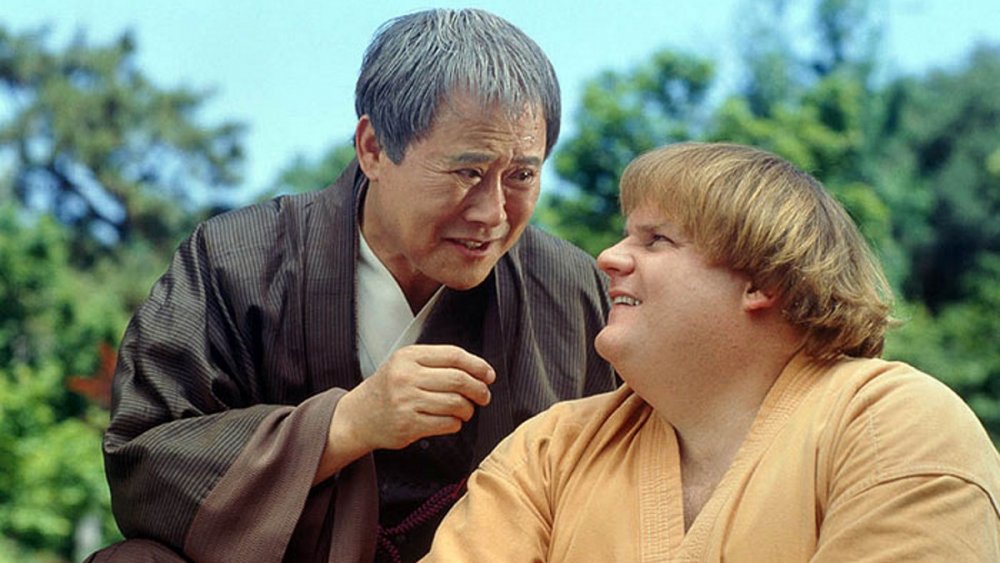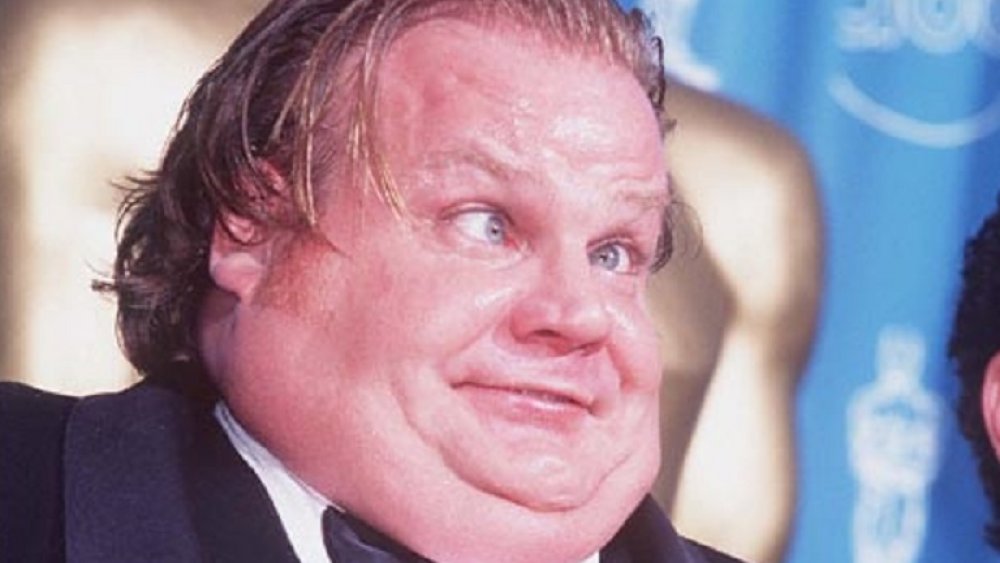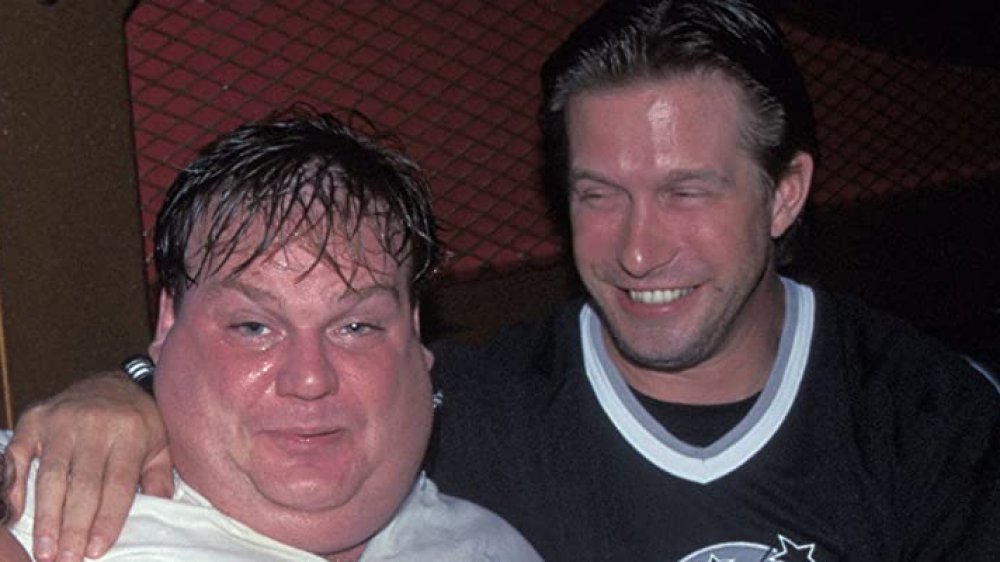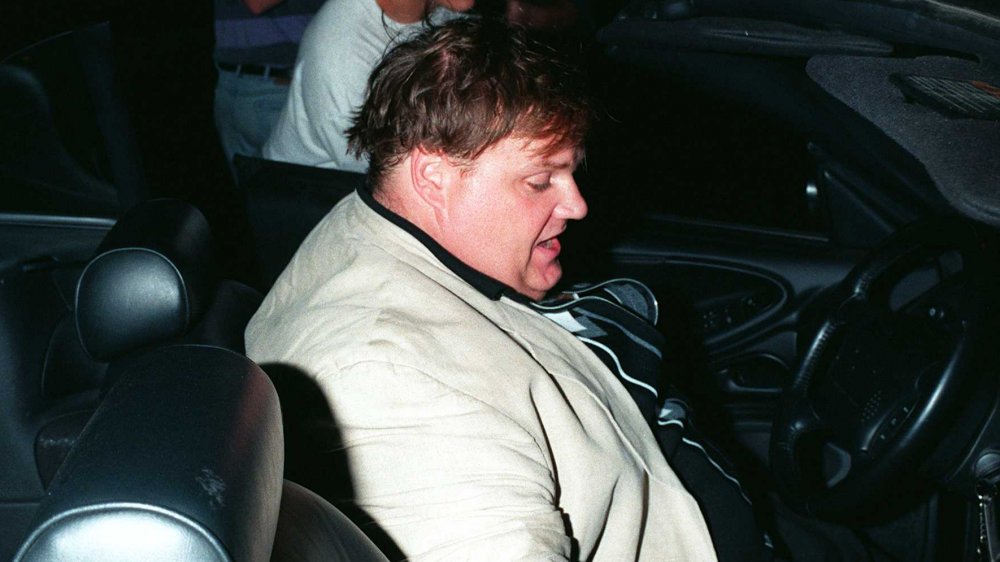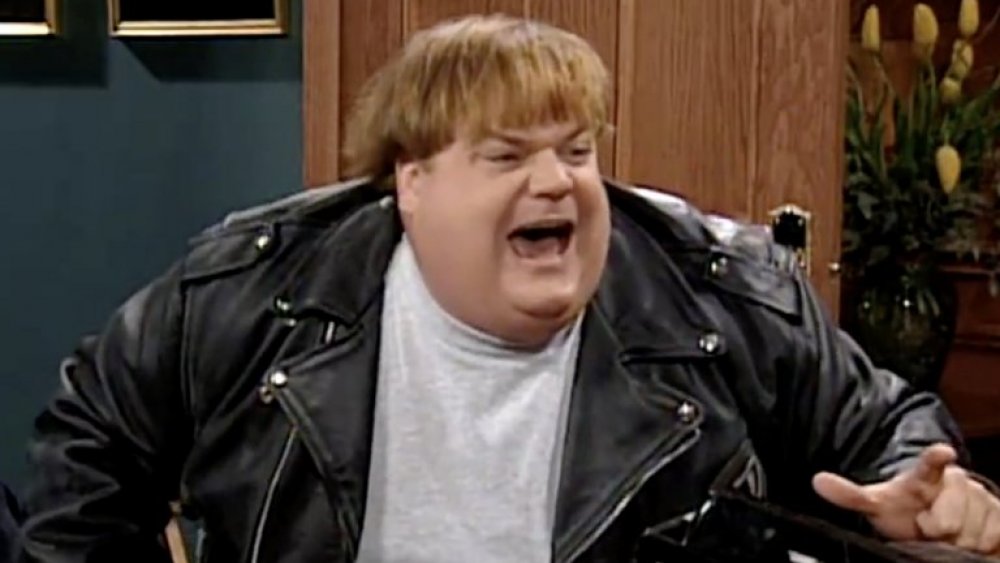What The Last 12 Months Of Chris Farley's Life Were Like
The '90s were a great time for comedy, and for a good part of that decade, nobody's star shone brighter than Chris Farley's. Beginning his career at Chicago's legendary Second City, Farley joined the cast of Saturday Night Live in 1990, quickly becoming known for his improvisational skills and manic physical style. Along with fellow cast members David Spade, Adam Sandler, Chris Rock, and Rob Schneider, Farley helped to make the venerable sketch comedy institution a wild, unpredictable place during his tenure, and many of his signature sketches have become the stuff of legend. Who could forget Farley auditioning for the Chippendale's dancers, grinding and gyrating alongside an ultra-ripped Patrick Swayze? Or his ultra-cringeworthy interview style as himself on The Chris Farley Show? Or his many appearances as motivational speaker Matt Foley, who lived "in a van down by the river?"
Unfortunately, those who knew him best have revealed that Farley's willingness to do anything for a laugh was born of a deep-seated insecurity which plagued him for his entire life. Like many such vulnerable types who find themselves in the white-hot public spotlight, Farley learned to cope via excessive consumption — food, alcohol, and drugs were his constant companions. He began 1997 as one of the biggest stars on the planet, but tragically, he would not live to see 1998 — and unlike many celebrities who passed away far too young, there was virtually nobody in Farley's orbit that didn't see his death coming, including the man himself. This is what the last 12 months of Chris Farley's life were really like.
Early 1997 should have been a great time for Chris Farley
Farley, along with Sandler, had been let go from SNL in 1995, but it had not been an acrimonious departure. Creator Lorne Michaels has spoken early and often of his fondness for Farley, and indeed, Michaels produced the two pictures that had proven the funnyman to be a bankable movie star in the wake of his SNL exit: 1995's Tommy Boy and 1996's Black Sheep, both of which paired him with friend and fellow SNL alum David Spade. 1997 kicked off with the release of Farley's biggest film yet: Beverly Hills Ninja, which opened in January and promptly became his highest-grossing starring vehicle. Unfortunately, this success would not portend a pleasant spring for the star.
Also in January, Farley alarmed his fans with a guest appearance opposite future SNL star Kenan Thompson on the Nickelodeon series All That in which he was visibly pale, sweaty, and out of breath. By all accounts, though, he had been sober for several months at this time, and had been in relatively good spirits after meeting with legendary playwright and screenwriter David Mamet in late 1996 to discuss taking on his first dramatic role, playing the early screen actor Fatty Arbuckle in a biopic. In March 1997, Farley accompanied Spade and several of his old SNL and Second City pals — including former SNL writer Conan O'Brien, Spade, Chevy Chase, and future Better Call Saul star Bob Odenkirk — to the U.S. Comedy Arts Festival in Aspen, Colorado, where things promptly started to go downhill.
Chris Farley's Aspen trip was a sign of things to come
In Tanner Colby's 2008 book The Chris Farley Show: A Biography in Three Acts, Farley's traveling companions describe how it quickly became apparent that the star was in major trouble. Farley's brothers John and Kevin, who also accompanied him on the trip, related how he was acting oddly even on the plane, and promptly began drinking and doing cocaine upon his arrival in Aspen. Spade recalled how he had forced Farley to bail on a formal dinner with the likes of Michaels, Dan Aykroyd, and Steve Martin due to his inebriation, and Chase — knowing that Farley idolized John Belushi, who had died of a drug overdose in 1982 at the age of 33 — remembered his own desperate attempt to intervene. "I read him the riot act that weekend. Everybody did. Chris was drunk and stoned and, on top of that, way overweight," Chase explained. "I sat with him and I said, 'Look, you're not John Belushi. And when you overdose or kill yourself, you will not have the same acclaim that John did... I've experienced this. I've seen who dies. I've seen how far you think you can go, what you can take and what you can't."
Odenkirk remembered that the situation only got worse as the trip wore on, as Farley drifted away from his friends and toward local party people who definitely did not have his best interests at heart. "[Farley was in] a limo. I go to the door and knock and the window rolls down. There's Chris, and he's packed in there with girls and hangers-on... I'd seen Chris f***ed up before, but this time he looked as bad as anyone has ever looked. It was a horrible thing to watch. It's one thing to shake your finger at a friend and say, 'You're gonna kill yourself.' It's another thing to look at him and know he's going to do it."
Chris Farley was in and out of rehab during his last summer
Colby writes that after the Aspen fiasco, Farley's agents insisted that he go to rehab, which he did (although he was allowed to leave to present at the Academy Awards in late March, with a chaperone by his side). Much of the next several months were spent in and out of different facilities, and during those times when he was not in rehab, he was working on a new project: recording lines for the title role in a DreamWorks animated feature, Shrek.
Of course, Mike Myers would take over the role after Farley's death — but the film's screenwriter Terry Rossio explained to Colby that the big green ogre's entire characterization was heavily inspired by Farley. "We spoke about the essence or wellspring of Chris's humor; much of it was the humor of discomfort," Rossio explained. "He would occupy a space of discomfort until it became funny. Shrek, in the Chris Farley version of the story, was unhappy at his place in the world, unhappy to be cast as the villain. So for me, Chris's comedic persona was key to the creation of the Shrek character — a guy who rejected the world because the world rejected him."
Despite the interesting new gig and the best efforts of friends, family, and rehab professionals, Farley's sobriety didn't take. In 1998, Entertainment Weekly reported that an unnamed friend of Farley's had spotted him at a Planet Hollywood opening in Indianapolis in July, obviously under the influence and putting on a typically big, loud, obnoxious show for the patrons. When this friend suggested that the comedian should perhaps slow down a bit, Farley simply grinned and said, "I want to live fast and die young."
Chris Farley discussed his mortality in one of his last interviews
Despite his cavalier attitude on that July night in 1997, there were signs that Farley knew that he was headed down a deadly path — and that he didn't, in fact, embrace his fate. Kevin Farley would later tell Colby that he and Jillian Seely, Farley's longtime friend and confidant, had done everything they could to pry him away from Planet Hollywood that night, and Jillian confided that Farley had called her the next morning, after she and Kevin had caught a red-eye flight back to Chicago. "He was like, 'Hey, what's going on? I'm back in Chicago. Want to get lunch?' The plane went right back for him and picked him up. No consequences for his actions at all. But his behavior at the party made the [National Enquirer tabloid] and the entertainment TV shows."
Just a short time later, Farley would get shockingly real during an interview with Playboy magazine, one of the last times he ever spoke publicly about his troubles with drugs and alcohol. "I used to think that you could get to a level of success where the laws of the universe didn't apply," Farley said (via Biography). "But they do. It's still life on life's terms, not on movie-star terms. I still have to work at relationships. I still have to work on my weight and some of my other demons. Once I thought that if I just had enough in the bank, if I had enough fame, that it would be all right. But I'm a human being like everyone else. I'm not exempt."
Chris Farley kept aiming for big laughs until the very end
The last time that Farley played to his adoring public was on October 25, 1997, when he returned to Saturday Night Live to host the show. The cold open featured Lorne Michaels himself, who in the bit was was debating cast member Tim Meadows and a guest-starring Chevy Chase as to whether Farley was put-together enough to perform his hosting duties. The pair assured Michaels that Farley was a new man — a notion which Farley, who had become well-known for his physical pratfalls while a cast member, promptly dispelled by racing onstage and flattening himself on Michaels' desk. Michaels gamely informed him that the desk was not a breakaway prop, but since his dedication was obvious, he could host. As the bit turned out to be a grim harbinger of the near future, it has been cut from SNL reruns, as has Farley's monologue (although both can be found online). But Farley, as he always did, gave the hosting gig everything he had.
Chris Farley passed away on December 18, 1997, from an overdose of the exact same drug combination that had killed his idol, Belushi, a quarter-century earlier. All these years later, he's still fondly remembered by his fans and his peers — many of whom have long maintained that his death was particularly tragic given his unrealized potential. In Colby's book, Tommy Boy and Black Sheep director Peter Segal lamented what might have been. "I thought he could win an Oscar one day," Segal said. "I know people might think I'm crazy saying that, looking at his brief career, but I really believed in his talent. It was way beyond what he was showing."
